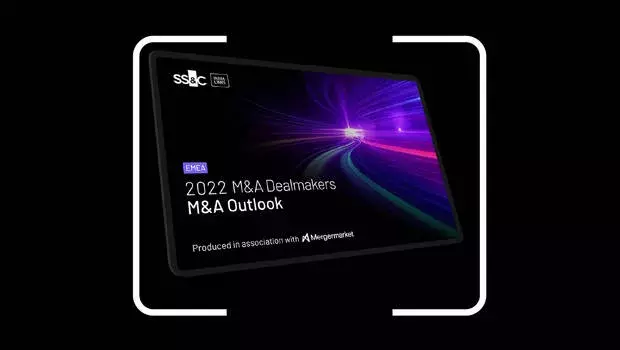European Regulation for the Technology, Media & Telecoms Sector
In this episode, we’re looking at the European Commission’s approach to a major telecom’s merger and new regulations being introduced in Europe and the U.K. to target the giants. Joining us from PaRR are Jeremy Fleming-Jones, a senior regulatory editor, and Jacob Parry, a senior reporter. Both are based in Brussels. Dealcast is presented by Mergermarket and SS&C Intralinks.
In this episode, you’ll learn about:
- MásMóvil and Orange: Is this deal a test of the EC’s stance on M&A?
- The wider regulatory TMT landscape in Europe
- New rules affecting the tech sector
- The potential impact of the Digital Markets Act on gatekeepers
- + more
Dealmakers, sign up for our monthly INsights newsletter here.
[MUSIC PLAYING] JULIE-ANNA NEEDHAM: Welcome to Dealcast, the weekly M&A podcast presented to you by Mergermarket and SS&C Intralinks. I'm Julie-Anna Needham, a business journalist who's been covering M&A for more than a decade. In this episode, we're looking at European regulation for the technology, media, and telecom sector, firstly at the EC's approach to a major telecoms merger and then, at the new regulation being introduced in Europe and the UK to target the tech giants.
I'm joined by Jeremy Fleming-Jones, Senior Regulatory Editor, and Jacob Parry, who is a Senior Reporter and who are both based in Brussels. Hi, Jacob. Hi, Jeremy. Thanks for joining me today.
JACOB PARRY: Hi Julie-Anna.
JEREMY FLEMING-JONES: Hi Julie-Anna.
JULIE-ANNA NEEDHAM: So Jacob, starting with you let's look at the potential tie-up between MasMovil and Orange, which is considered something of a test for the EC's stance on telco or telecoms mergers. Expectations have been growing that the EC is prepared to be a bit softer on these deals. From what you understand, is that the case?
JACOB PARRY: The short answer is no, the Commission has repeatedly said that there's no magic number when it comes to telecoms consolidation. Just a reminder, on this transaction, we're dealing with a 50-50 joint venture in Spain, where MasMovil and Orange are looking to combine their Spanish operations, these being the number three and the number four players in the Spanish mobile market.
In terms of the Commission's position, we've heard executive vice president Vestager say quite recently, there's no magic number and that she would be concerned, in fact, she would be made a bit nervous if consumer choice were to be limited too much in national markets. However, it's clear that there's an industry need for consolidation. Just look at some of these recent transactions that have been proposed. We have this deal in Spain, in the U.K.
We have some chatter of 3m Vodafone looking to combine. In Italy, TIM is looking to create a network monopoly through its restructuring and merger with Open Fiber and Vodafone's CEO Nick Read has given numerous indications that he intends to pursue mergers in the U.K., Italy, Portugal, and Spain.
So what's changed? Sort of two things. The first is the stance of the EU courts. We had a landmark judgment in 2020 from the EU general court that overturned the Commission's decision to block the combination of O2 and Hutchison in the U.K. The court found that the Commission failed to demonstrate that the transaction had negative effects.
And it's effectively set a quite high bar for the Commission to prove negative effects when we're dealing with an oligopolistic scenario, like a four-to-three transaction. That case is before the European Court of Justice, which will hear it in Luxembourg next month. It's to be seen whether or not the Top Court will side with the Court of First Instance and then, also, whether or not the Commission will really start to abide to what the General Court has said.
Second item, we might get a bit more into, and that's the proposal by the Commission to make telco users — the biggest ones being the big tech companies, like Google, Apple, Facebook, and Amazon, and Netflix — pay for telecom services. This is a bit goes in the direction of the need for investment that telecoms in Europe have been raising given the steep bills that they're looking out in order to roll out fiber and then also fund investments in 5G. It's to be seen whether or not this will make a huge difference.
But by all indications, the Commission is appearing to dangle new proposals like this one we saw disclosed a few weeks ago to have Google, Apple, Facebook, and Amazon pay their way for broadband service. Again, I'd say that there are several things moving. Clearly, the market has an appetite for consolidation. But it doesn't appear that the Commission really wants to lessen up on its competition tools just yet.
JULIE-ANNA NEEDHAM: And are our telcos using that argument that you mentioned, the need for consolidation and investment in an expensive 5G infrastructure? Is the EC shown to be reluctant to listen to that argument, and is that changing?
JACOB PARRY: Yes and no. It's changing insofar as the Commission is buying that argument, but no in terms of whether that argument has any credence in terms of the telco's ask that it let up or ease up on merger control. Instead, what we've seen is a Commission proposal. We have not many details at this point. But it seems like the Commission will come forward with a regulatory proposal this year that would require, as I was saying, companies like Google, Apple, Facebook, and Amazon, and Netflix to pay a share of their revenues to telco providers to help fund investments in fiber and 5G.
This is not a new issue. These companies, the telecom providers have been complaining for more than a decade that some of the big US tech giants have been getting a free ride on their expensive infrastructure. But the fact that the Commission is finally starting to listen to those arguments and is looking to propose something that would go quite a ways to satisfying the demands of telcos is quite significant.
JULIE-ANNA NEEDHAM: Jeremy, coming to you, let's look at the wider regulatory landscape in Europe for the broader sector of TMT. There are a raft of new rules coming in Europe affecting the tech sector. Can you outline what those are, and what is the likely timeline of those, please?
JEREMY FLEMING-JONES: That's right. Well, this new Digital Markets Act has been agreed politically by the European institutions in March. And it's now having its text finalized. And this is a new law which is designed to run adjacent to an existing competition rules but to impose rules and obligations onto companies in advance, rather than to look at conduct after it's happened, which is what their existing toolbox does.
And the new DMA, as it's called, is going to affect digital giants or gatekeepers, as they're referred to in the text. And gatekeepers are defined under the law as being companies which perform a core platform service. So this touches on a whole raft of digital areas-- online search engines, social networking services, video sharing, cloud computing, and so on. But you also have to have a significant impact on the domestic market and a stable market position.
And there are some definitions to help clarify what that means. So for example, if a company has a turnover or a market cap of at least USD 75 billion euros, then that would lead to the presumption. If it offers a core platform service and/or if its annual revenue is 7.5 billion euros and then a certain number of users — so if it reaches 45 million users per month and 10,000 business customers each year. So we're looking really here at mainly those big tech giants that fall into the category that Jacob was saying are coming under scrutiny separately as potential players who could be contributing on the infrastructure market for tech as well, for telco as well.
JULIE-ANNA NEEDHAM: How many businesses will apply to? Because there can't be that many in the world that would meet those criteria.
JEREMY FLEMING-JONES: Well, obviously, the rule book is not yet on the books. And it's not going to be introduced until next year, probably. It will be brought into the official journal in October this year. But there'll be then a six-month period while the Commission determines exactly how many gatekeepers there are to start with.
But companies have an obligation to declare themselves to be gatekeepers if they fulfill, clearly, the requirements under the law. And in addition to that, they can be defined as being gatekeepers by the Commission as well if they don't, for example, fall into those presumptions. But they are core service providers.
So there is no straightforward answer to how many is on the list, but the one thing that I think we can be pretty clear about is that the big tech operators are all going to be there. There are some questions, for example, about whether or not any European companies are going to be included in the list, and that creates a kind of political question mark. But I think that we can be really clear that the Google, the Amazons, Facebooks, the Apples are going to be among the gatekeepers.
JULIE-ANNA NEEDHAM: And what do those companies have to say? Because I'm guessing they're being consulted as part of this.
JEREMY FLEMING-JONES: Exactly so, yes. Well, I mean, the rules will require them to observe new conditions, so they will have to do certain things as a result of being determined as gatekeepers. But they will also not be allowed to do certain other things as well.
So among the positive obligations that they would have to do is to interoperate with their service providers, provide advertisers with information, allow users to use their platforms under certain conditions of non-discrimination, data portability, and so on. But what they'll be stopped from doing is aggregating end-user data, aggregating all sorts of data for self-preferencing services, bundling their services, and so on. So there's a whole bunch of things that they can and can't do if they're determined as gatekeepers.
JULIE-ANNA NEEDHAM: And will these rules only affect the conduct of those big tech companies? Or will they also impact deals as well?
JEREMY FLEMING-JONES: There is no huge deal direction within the law, but there is a notification requirement for gatekeepers, that if they are trying to merge with other digital companies, then they have to notify the Commission that they are doing so. And this is being done in order to help the Commission with so-called killer acquisition deals — to identify killer acquisition deals.
And it means that where a gatekeeper is buying a much smaller company, that will be notified to the Commission in a way that gives other member states the opportunity to ask the Commission to look at the deal in more detail under its Article 22 procedure as well. So while there is no formal request for the Commission or ask for the Commission to look at the deal, there is more scope under the notification process of the DMA for deals to come under the scope of Article 22 notification.
JULIE-ANNA NEEDHAM: And just remind us what that Article 22 notification is.
JEREMY FLEMING-JONES: That's a way in which member states are able to flag a deal to the Commission and ask it to do a review of the deal, even if the deal does not fall within the normal thresholds that would apply.
JACOB PARRY: One of the more interesting provisions of the DMA that was agreed in the negotiations between the EU member states, the Commission, and the Parliament was to add a penalty whereby if a company is found to be in violation of the DMA repeatedly, they could face a ban on acquisitions. Now, that's a power that has a quite long timeline, and it would really need to see a long well-documented series of violations. But it sits in the Commission's toolbox, and it's something that I would imagine companies will have in mind when they're thinking about compliance.
JEREMY FLEMING-JONES: Yeah, I mean, indeed, that is one of the several compliance methods. I mean, they can also be clobbered for fairly significant fines-- up to 10% of annual turnover, for example, which, when you're looking at a company like Google, would not be inconsiderable.
JACOB PARRY: Just finally, it's worth mentioning that this legislation comes against the context of incredible scrutiny of the merger and acquisition activity by companies like Google, Apple, Facebook, and Amazon. Transactions like WhatsApp, Facebook have left an incredibly bad taste in the mouth of the Commission and its fellow national competition authorities. And as we can see, there is a strong willingness to really look through every one of these deals down to the last detail and to come up with quite novel theories of harm.
We actually had a comment from the President of the German Competition Authority who, in clearing Facebook's acquisition of customers, said that the transaction gave him a bad stomachache. There were no anti-competitive grounds to go after that transaction. But still, it's something that caused a lot of concern in the agency.
So this is really a topic that's not going away. And I think that any merger activity by Google, Apple, Facebook, Amazon, or even Microsoft as well will come under incredible scrutiny by the competition authorities. And the DMA is just one more tool with which they'll be able to do so.
JULIE-ANNA NEEDHAM: And one last question for you, Jeremy, where is the UK on this, obviously having left the European Union recently?
JEREMY FLEMING-JONES: Well, the U.K. has been trying to develop its own digital regulation to hit the markets too. But unlike the E.U., which he's been trying to develop the law before it develops the enforcement practice, the UK actually created an enforcer group called the Digital Markets Unit last year. And it made that unit in shadow form and put it in the Competition and Markets Authority ahead of legislating.
And the government, last year, launched a consultation on the design of a new regime for that unit to operate under and published its response to that consultation this month, confirming its plans to give the enforcement powers to the unit. But we haven't yet seen a bill from the UK government, which gives more clear clarity to what those powers will actually be. We know that they are broadly going to involve promoting the competition in digital markets, that they will create minimum revenue thresholds for firms that come under its scope, and those firms are going to be called the Strategic Market Status firms.
And it's going to set out conduct requirements for those firms, unlike the E.U. rules, which have a broader set of requirements for its gatekeeper companies to follow, and obey, and prevent them from doing. The U.K. rulebook is designed to have a much more tailored approach, so that the CMA unit, this DMU, will talk to firms which fall within the strategic market status category and tailor make for them a bunch of conduct requirements.
And I think it's fair to say that although we haven't yet seen what these conduct requirements might require on the merger notification front, we know that the Digital Markets Unit that has been created in shadow form has already been used for its digital expertise in assessing some digital mergers in the UK and that the whole enterprise of the DMU is designed to sharpen the CMA's expertise in assessing digital mergers and digital markets more generally.
JULIE-ANNA NEEDHAM: One follow-up question, which will be the final question, I promise, but does it feel like the Digital Markets Unit of the CMA and then the EC legislation with the DMA-- does it feel like it's all playing catch-up with the sector which has just expanded so quickly? And it's like the regulation hasn't really been able to keep up.
JEREMY FLEMING-JONES: Well, I think that is definitely the idea behind these rules. But they are quite wide-ranging. And the approach, as I say, is to try and go one further from existing competition rules, which are designed to make existing conduct better or catch companies out. These new rules, these new rule books tend to be an attempt at upfront regulation to stop them doing things in the first place. And from that perspective, the regulators themselves would like to see themselves as having leapfrogged the digital companies in their attempts to regulate.
So they think of themselves as unrolling much tougher rules which are more flexible, designed to kind of catch behavior in advance. But the proof of the pudding will be in the eating. And if, as they have proved to be in the past, digital giants are as flexible and able to deal with the rules and weave around them as they might be perceived to have done with the existing rule books, then that won't be the case.
JULIE-ANNA NEEDHAM: Great. Jacob and Jeremy, thank you very much.
[MUSIC PLAYING]
That was Jacob Parry and Jeremy Fleming-Jones. Thanks for listening to this week's episode of Dealcast presented by Mergermarket and SS&C Intralinks. Please rate, review, and follow the podcast.
You can find us on Apple Podcasts, Spotify, or look out for your emerging Mergermarket news alert. For more information, check out our show notes. Join us next week for another episode.
[MUSIC PLAYING]



